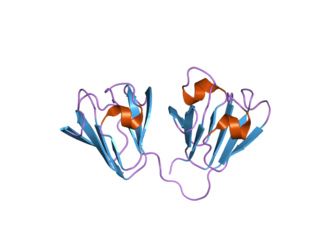Affilin
Affilin
Affilin is a type of protein that is engineered to bind to specific target molecules. These proteins are derived from ubiquitin, a small regulatory protein that is found in almost all tissues of eukaryotic organisms. Affilins are part of a class of proteins known as scaffold proteins, which are used in biotechnology and therapeutics for their ability to bind to specific targets with high affinity and specificity.
Structure
Affilins are based on the structure of ubiquitin, which is a small, stable protein consisting of 76 amino acids. The structure of ubiquitin is highly conserved and consists of a compact, globular fold. This fold is characterized by a beta-grasp topology, which is a common structural motif in proteins. The stability and solubility of ubiquitin make it an ideal scaffold for engineering new binding proteins.
Engineering
The engineering of Affilins involves the introduction of mutations into the ubiquitin scaffold to create new binding surfaces. This is typically done using techniques such as directed evolution or rational design. The goal is to create a protein that can bind to a specific target molecule, such as a receptor, enzyme, or antigen.
Applications
Affilins have a wide range of applications in both research and medicine. In research, they are used as tools for studying protein-protein interactions, signal transduction, and other cellular processes. In medicine, Affilins are being developed as therapeutic agents for the treatment of diseases such as cancer, autoimmune disorders, and infectious diseases. Their small size and stability make them attractive candidates for drug development.
Advantages
Affilins offer several advantages over traditional antibody-based therapies. They are smaller and more stable, which allows for better tissue penetration and longer shelf life. Additionally, they can be produced in bacteria or yeast, which makes them more cost-effective to manufacture. Their ability to be engineered to bind to virtually any target makes them highly versatile.
Related pages
Gallery
Transform your life with W8MD's budget GLP-1 injections from $125.
W8MD offers a medical weight loss program to lose weight in Philadelphia. Our physician-supervised medical weight loss provides:
- Most insurances accepted or discounted self-pay rates. We will obtain insurance prior authorizations if needed.
- Generic GLP1 weight loss injections from $125 for the starting dose.
- Also offer prescription weight loss medications including Phentermine, Qsymia, Diethylpropion, Contrave etc.
NYC weight loss doctor appointments
Start your NYC weight loss journey today at our NYC medical weight loss and Philadelphia medical weight loss clinics.
- Call 718-946-5500 to lose weight in NYC or for medical weight loss in Philadelphia 215-676-2334.
- Tags:NYC medical weight loss, Philadelphia lose weight Zepbound NYC, Budget GLP1 weight loss injections, Wegovy Philadelphia, Wegovy NYC, Philadelphia medical weight loss, Brookly weight loss and Wegovy NYC
|
WikiMD's Wellness Encyclopedia |
| Let Food Be Thy Medicine Medicine Thy Food - Hippocrates |
Medical Disclaimer: WikiMD is not a substitute for professional medical advice. The information on WikiMD is provided as an information resource only, may be incorrect, outdated or misleading, and is not to be used or relied on for any diagnostic or treatment purposes. Please consult your health care provider before making any healthcare decisions or for guidance about a specific medical condition. WikiMD expressly disclaims responsibility, and shall have no liability, for any damages, loss, injury, or liability whatsoever suffered as a result of your reliance on the information contained in this site. By visiting this site you agree to the foregoing terms and conditions, which may from time to time be changed or supplemented by WikiMD. If you do not agree to the foregoing terms and conditions, you should not enter or use this site. See full disclaimer.
Credits:Most images are courtesy of Wikimedia commons, and templates, categories Wikipedia, licensed under CC BY SA or similar.
Contributors: Prab R. Tumpati, MD





